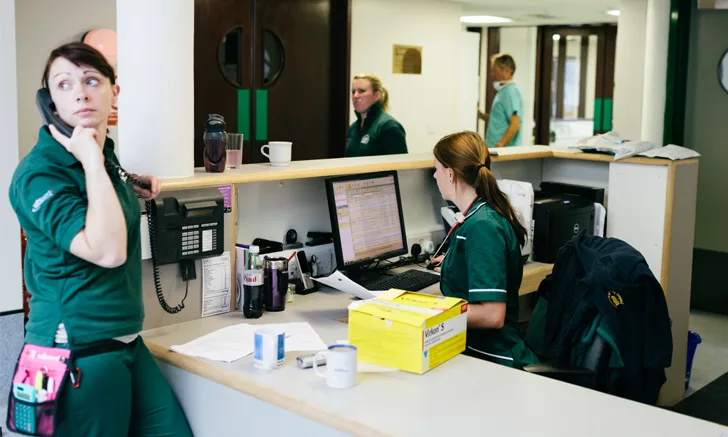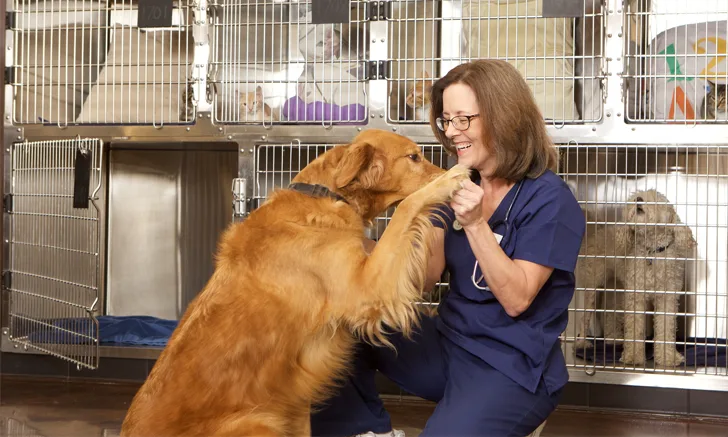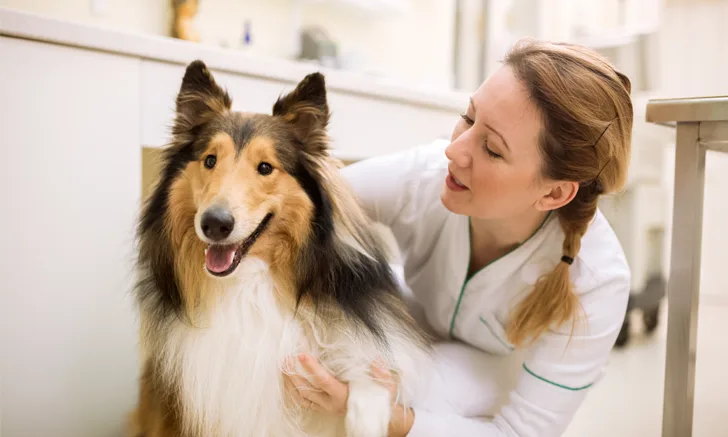
It’s no secret that many veterinarians are feeling pushed to their limits in practice. With increased client demand and fewer hands to help, it might be easy to chalk up the current situation to a simple shortage of veterinarians. Just graduate more veterinarians, and the problem will solve itself, right?
We talked to 3 veterinarians about what it feels like to be working in the veterinary industry right now, what might be driving the perceived shortage, and whether this era of veterinary medicine is sustainable.
*To respect interview subjects' anonymity, names and likenesses have been changed.

Andrea* has been in practice for 15 years, and recently transitioned to a training and mentorship role. She lives in Albuquerque, New Mexico.
It’s a difficult thing to get your arms around. I'm not sure shortage is even really the right word. There's not necessarily a lack of people with the proper training. It's just that they're not willing to do the job right now for a variety of reasons. A lot of people are retiring. A lot of people are working part time. If you choose to have a child, you are out of the workforce to some extent for a period. Because most veterinarians are women, that is a real issue for our workforce. It’s not a bad thing, but it is something that we contend with.
In my opinion, a lot of practices think they need more doctors, when they actually need more support staff. They need a different type of scheduling. Some of the issues are more about efficiency and empowering your support staff. Our support staff have an incredible amount of talent and training and communication skills, but often they're limited to restraining and drawing blood. And that's not engaging as a career. I think if we did a better job leveraging that talent, we might be better off.
In my opinion, a lot of practices think they need more doctors, when they actually need more support staff.
I guess I'm not convinced the entirety of the problem is a veterinarian shortage per se. A lot of issues that have been present in the industry for a long time came to the fore with COVID. It became more obvious where we had some shortcomings. I think that sped up the burnout for a lot of different people in the field. When I left full-time practice, I was the fourth of six doctors to leave. A couple of weeks ago, the fifth doctor also put in notice.
We interviewed for veterinarians and the corporate practice offered very high starting salaries. But the number of patients we were asked to see in a day… I was working 16 hours a day for a 10-hour shift. No one's going to do that. There's a point at which, no matter how much you pay somebody, the workload is too much. The managing doctor told me, “At this point, I'll take a warm body.” And I said, “I think that's the problem. If you don't want turnover, if you want us to stay, you need to have a mission-driven practice. Those things are not about money.”
If you don't want turnover, if you want us to stay, you need to have a mission-driven practice. Those things are not about money.
I have been in practice for almost 15 years, and I've been in the field for almost 30 years. I recently transitioned into a different role as a clinical mentor veterinarian. My job is to provide new graduates with balanced curriculum as they move from the classroom into practice. I do hands-on surgical training, case discussions, and then some financial education. It’s been so wonderful to work with new graduates who are still so joyful about the profession and medicine itself, which is important to me.
My new role is very exciting, but I still have some sort of ethical guilt about the shortage. So I also continue to pull both GP and emergency relief shifts. I have the luxury of doing so though, because I have a husband who doesn't mind, and he also works a lot, and I don't have kids. I do think that makes a difference when you're making those decisions.
Your Voice in Clinician's Brief
We're talking to our readers about everything from practice vacation policies to euthanasia—and there's no right answers. Fill out the submission form here to participate.

Kathryn* worked in general practice for 13 years, until switching to relief work about a year ago. She lives in Raleigh, North Carolina.
I feel like years ago, there would be busy days and there would be less busy days. It seems like ever since COVID, it's constantly been busy and it just hasn't stopped. I think the reasons for that are complex and I don't know that we've quite figured them out yet. Some vets retired and that played a big role, but there's just so much more demand for our services now than I feel like there was when I graduated in 2009.
I read one article more recently that portrayed female veterinarians as trying to prioritize family life over working long hours. I guess they were trying to say that people want a work-life balance, but it kind of sounded like, “newer vets don’t want to work.” And I don't think that's the case at all.
You can't say yes to everything. There's only so many hours in a day.
In our society the fact is that women still carry more of the burden of childcare. It all falls on our shoulders. I've got two kids and my husband and I both work. I can't be on call all the time. So when some of the media makes it seem like we’re not wanting to work, that's just not the case.
I personally know several veterinarians who have left clinical practice to do other things in the industry. I think a lot of that was just burnout. I was very close to that before I took the relief job. I considered doing something totally different. I was like, could I teach? Could I do something else? I felt like I couldn't do it anymore. The stress was so much.
Practices that prioritize the mental health of the people who work there tend to do better.
As a relief veterinarian, I see how different practices set client expectations. The clinics that try to continually take on everything end up getting more burnout, getting more staff turnover, which doesn't end up helping the animals. You can't say yes to everything. There's only so many hours in a day. There's only so much you can do with the staff that you have.
Practices that prioritize the mental health of the people who work there and give them the ability to say no tend to do better. Practices that realize that someone can only do so much, that they might not have enough staff to be able to see some cases, are able to set realistic expectations for clients.
My hope is that it's temporary, but unfortunately, it's a pipeline. It is a highly trained field. It takes four years to pump out the next line of veterinarians, so it's not an instant fix. My hope is that it's temporary. But we're probably talking years as opposed to a couple of months.

Heather* has been a veterinarian since graduating in 2000. She works just outside Philadelphia, Pennsylvania.
It's funny, because for a long time, people have talked about a veterinary shortage, even pre-pandemic. What I would hear in informal discussions of this coverage of the veterinary shortage is these people are crazy. There's not a veterinary shortage. There's plenty of veterinarians with a shortage of veterinarians who want to work for low pay.
So we ended up with plenty of veterinarians who are fully qualified and maybe even want to be in clinical practice in certain specialties, like large animal, food animal, or even in general small animal, but they don't want to work for what they perceive to be unacceptably low pay. And so they go into other jobs. I mean, they are still veterinarians, right?
I love being a veterinarian and I wouldn’t want to do something else. If my personal financial situation were different, I might feel differently. I'm super, super lucky that I don't have crippling student debt. I don't have to support my family. I obviously prefer to be fairly compensated for what I do. But I have wiggle room. And not everyone does.
I'm only one person, and I can only do what I can do. I only have so many hours in the day. And I still show up for work because I love my job.
It's frustrating right now. I feel like I can't accommodate my patients’ needs. I think everyone is frustrated that we can't provide every patient with the level of care we would like to provide, or any care in some circumstances. It makes us feel like we're not meeting our end of the deal. If every time I called my doctor, he said, “I'm sorry, I'm too busy. I can't see you until next month,” I'd be pissed.
Sometimes people joke about saying to the client, “Okay, sure, I will see you today at 2:30, but you need to pick from this list of 5 other people that I'm supposed to be see at that time and tell them I gave their slot to you."
We’re too busy and I feel we're sort of throwing up our hands in despair. I feel like everyone is facing burnout every day in this profession. We do what we can to support each other. But what can really be done with this problem of not being able to do what you're trained to do? These problems are outside my control and I just keep reminding myself, I'm only one person, and I can only do what I can do. And I only have so many hours in the day.
And I still show up for work because I love my job. I really do. I love being a veterinarian. It's what I've always wanted to do. It's exactly what I always dreamed of. I think my first job was in the sixth grade, working for a vet. It's depressing when you're doing everything you can to help an animal and the animal's owner doesn't recognize that you are working within certain limitations that are out of your control. But even if some owners are assholes, I love taking care of animals. It's not the animal's fault.